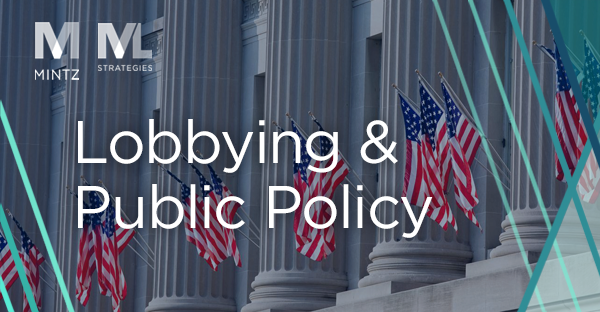Energy & Sustainability Washington Update — October 2022
Rollout of IRA Clean Energy Provisions Continues
As reported in last month’s Washington Energy & Sustainability Update, implementation of the Inflation Reduction Act of 2022 (IRA), including its clean energy provisions, is underway.
On September 12, President Biden issued Executive Order 14082, “Implementation of the Energy and Infrastructure Provisions of the Inflation Reduction Act of 2022.” The Executive Order states that the IRA is “the single largest and most ambitious investment in the ability of the United States to advance clean energy, cut consumer energy costs, confront the climate crisis, promote environmental justice, and strengthen energy security.” With the Executive Order, President Biden has created a new White House Office of Clean Energy Innovation and Implementation tasked with coordination of the policymaking provisions of the IRA. The Executive Order amends Executive Order 14008 on “Tackling the Climate Crisis at Home and Abroad,” which President Biden issued just days into his presidency, by creating a new position of Senior Advisor for Clean Energy Innovation and Implementation at the National Climate Task Force and making the National Climate Advisor vice chair of the Task Force.
The president has named John Podesta, who served as chief of staff to President Clinton, as the new Senior Advisor for Clean Energy Innovation and Implementation. Ali Zaidi, an alum of the Obama Administration, is being promoted from Deputy National Climate Advisor to National Climate Advisor.
The Executive Order expands the mission of the National Climate Task Force to include coordinating effective inter-agency implementation of the IRA, with instructions to “facilitate planning and implementation of key federal actions to reduce climate pollution; increase resilience to the impacts of climate change; protect public health; conserve our lands, waters, oceans, and biodiversity; deliver environmental justice; spur well-paying union jobs and economic growth; coordinate effective implementation of Public Law 117-169, commonly referred to as the Inflation Reduction Act of 2022, in coordination with the Infrastructure Implementation Task Force established in Executive Order 14052 of November 15, 2021 (Implementation of the Infrastructure Investment and Jobs Act), as appropriate; and accelerate clean energy innovation and deployment.”
The White House has also launched a new IRA website – www.cleanenergy.gov – to provide updates on the implementation of the new law. While direct funding opportunities under the IRA have not been announced yet, many of the IRA’s tax provisions became effective upon enactment into law. The new website provides consumers with information on how to avail themselves of several of those tax incentives either “right now” or “next year,” with a focus on incentives for installing rooftop solar on a home, making homes and appliances more energy efficient, replacing furnaces or air conditioners with more efficient products, and buying an electric vehicle.
To read more from ML Strategies on funding opportunities in the IRA, as well as an analysis from Mintz on IRA’s clean energy tax incentives, please click HERE.
Energy Permitting Bill Stalled – For Now
As part of the agreement between Senate Majority Leader Schumer (D-NY) and Sen. Manchin (D-WV), and with the support of President Biden and House Speaker Pelosi (D-CA), to advance the IRA in August, a handshake deal was agreed upon regarding comprehensive energy permitting reform legislation to be passed before the end of the fiscal year on September 30, 2022.
On September 13, Sen. Manchin released the Energy Independence and Security Act of 2022. The bill would streamline the process for authorizations and reviews of energy and natural resources projects, prioritize energy and mineral projects of strategic national importance, make changes to the existing FAST-41 permitting law related to energy and natural resource projects, specify procedures for state certification that projects comply with applicable water quality standards, expand existing authority to give the federal government increased permitting authority for transmission lines, clarify that the Federal Energy Regulatory Commission has jurisdiction to regulate interstate hydrogen infrastructure, and require federal agencies to issue all approval and permits necessary for the construction of the Mountain Valley Pipeline.
While energy permitting reform has been a long-time goal of Republicans, Sen. Manchin’s bill faced strenuous objections from some Republicans to its inclusion in the Continuing Resolution, finalized on September 30 and extending federal appropriations through December 16, when the annual appropriations process will be completed or further extended into next year. While some Democrats and climate advocacy groups also opposed the bill, others supported it, saying the increased authority for transmission lines was needed to make the renewable energy provisions of the IRA a success.
Sen. Manchin asked that the bill be removed from the final CR language so as to not endanger its final passage; he will continue to seek a pathway to approval in the coming weeks. The two most obvious options are inclusion in the annual National Defense Authorization Act, must-pass legislation we expect to see approved toward the end of the year, or in the end-of-year omnibus spending bill that will finalize Fiscal Year 2023 appropriations while also tackling other outstanding legislative priorities before the end of the 117th Congress.
Sen. Manchin’s West Virginia colleague Sen. Capito (R-WV) has her own energy permitting legislation that has Republican support, so some compromise between the two senators may be the most likely path forward.
National Clean Energy Week
The Senate unanimously approved a resolution designating September 26 through September 30 National Clean Energy Week. The resolution was sponsored by Sens. Cantwell (D-WA) and Collins (R-ME) and cosponsored by Sens. Braun (R-IN), Burr (R-NC), Capito (R-WV), Coons (D-DE), Duckworth (D-IL), Feinstein (D-CA), Graham (R-SC), Hickenlooper (D-CO), Hirono (D-HI), King (I-ME), Luján (D-NM), Manchin (D-WV), Portman (R-OH), Reed (D-RI), Romney (R-UT), Rosen (D-NV), Shaheen (D-NH), Sinema (D-AZ), Smith (D-MN), Sullivan (R-AK), Tillis (R-NC), Warnock (D-GA), Warren (D-MA), and Whitehouse (D-RI). Read the resolution by clicking HERE.
Bipartisan Infrastructure Law Opportunities
Over the next five years, the Bipartisan Infrastructure Law will stand up 60 new DOE programs, including 16 demonstration and 32 deployment programs, and expand funding for 12 existing Research, Development, Demonstration, and Deployment (RDD&D) programs.
In September, DOE announced the following funding opportunities:
- Rare Earth Element Demonstration Project (Funding Opportunity Announcement) to award $156 million for a first-of-a-kind facility to extract and separate rare earth elements (REE) and critical minerals (CM) from unconventional sources like mining waste. Eligible applicants are U.S. academic institutions. DOE will hold an informational webinar on October 13, with applications due November 21.
- Regional Clean Hydrogen Hubs (Funding Opportunity Announcement) to award up to $7 billion for the creation of six to ten regional clean hydrogen hubs across the nation. The hubs will demonstrate the production, processing, delivery, storage, and end-use of clean hydrogen, in support of the Biden Administration’s climate goals. They will form the foundation of a national clean hydrogen network that will contribute substantially to decarbonizing multiple sectors of the economy and creating jobs. Eligible recipients of funding include technology developers, industry, utilities, universities, national laboratories, engineering and construction firms, state and local governments, tribal, environmental groups, and community-based organizations. Concept papers are due November 7, with full applications due April 7, 2023.
As implementation of the Bipartisan Infrastructure Law and Inflation Reduction Act continues, ML Strategies professionals, along with our colleagues at the Mintz law firm, welcome the opportunity to answer any questions about how these landmark laws may impact your business or organization.

Energy & Sustainability Washington Update — September 2022
August 29, 2022| Blog

Energy & Sustainability Washington Update — August 2022
August 1, 2022| Blog


